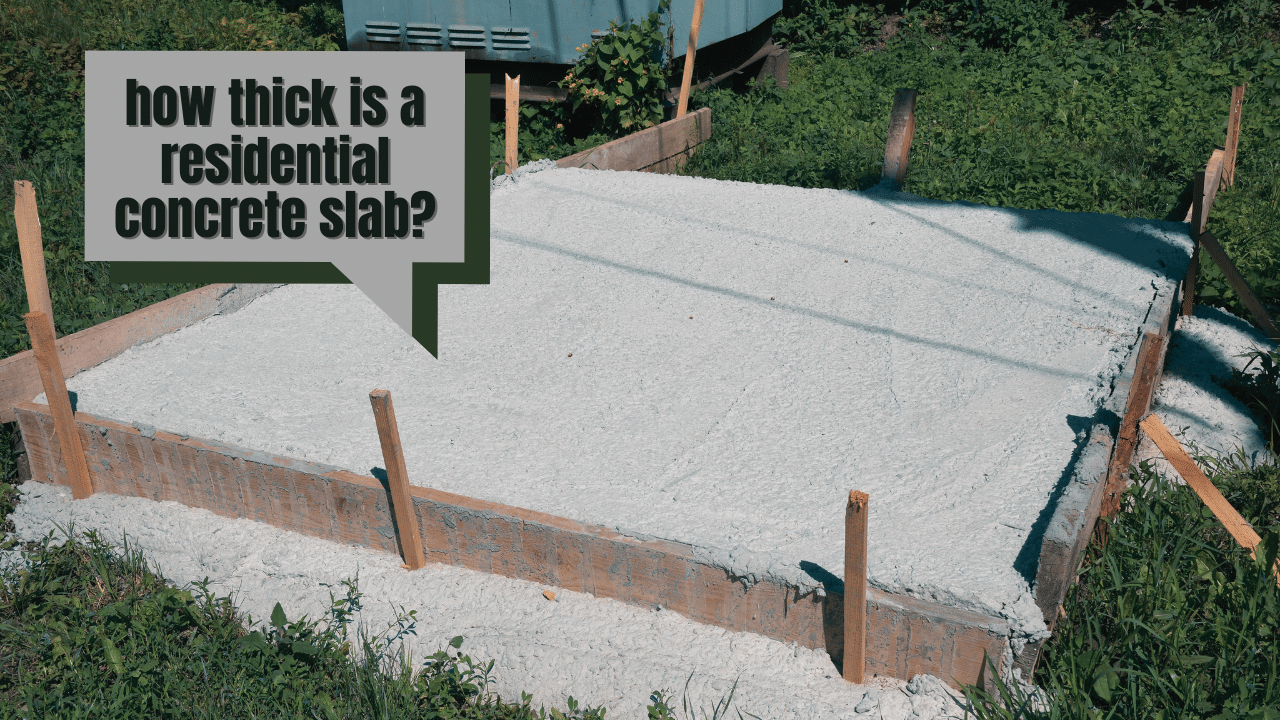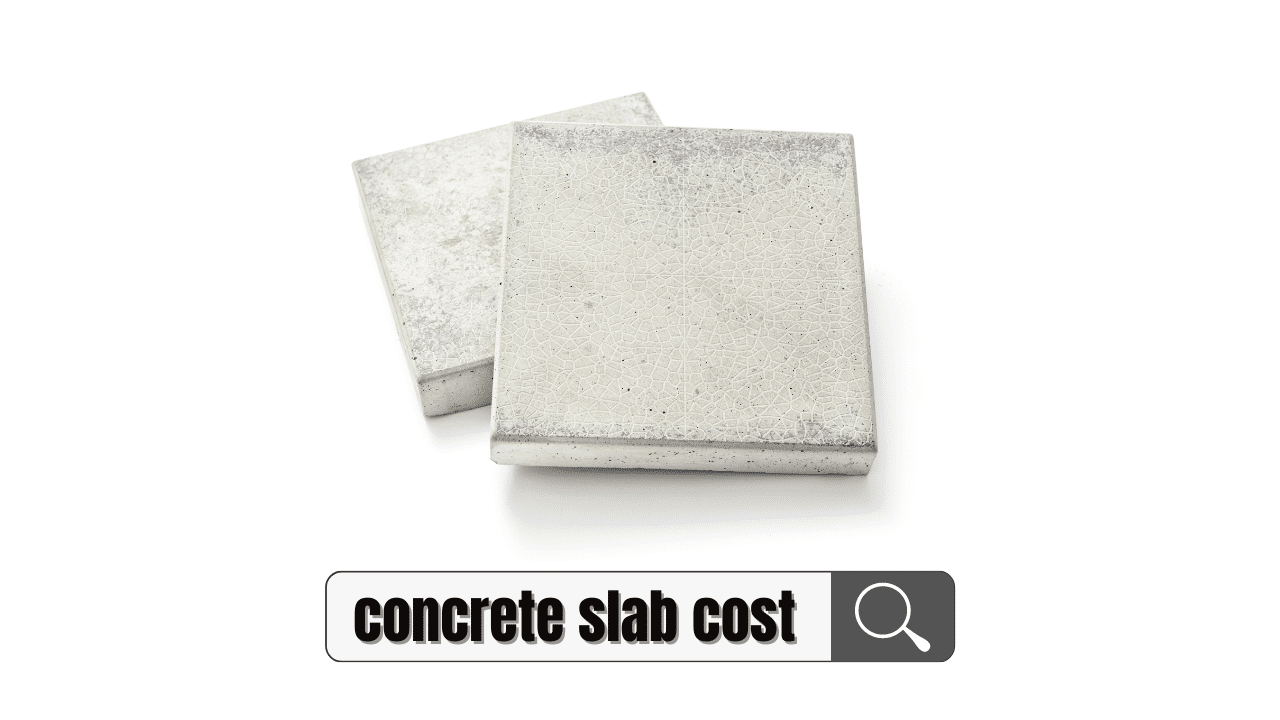Concrete is one of the most durable and hard-wearing surfaces available and provides a sturdy foundation for a range of building projects. Whether you’re laying a driveway, installing a car lift, or building a garden shed, you’re probably considering using concrete for the foundation.
As you might already know, you need to think carefully about the thickness of the concrete that you lay, as certain projects require thicker concrete than others. As such, we’ve put together this helpful concrete thickness guide to help you decide on the correct concrete thickness for your residential project. Let’s begin by looking at the minimum thickness a concrete slab needs to be.
How Thick Does a Concrete Slab Need to Be?
For residential properties, a concrete slab needs to be at least four inches thick to comply with building codes. An additional two inches are recommended if your concrete will regularly receive heavy loads like motor homes or garbage trucks.

But overall, concrete that is 4-6 inches thick should be sufficient for most residential projects. The concrete mixture also needs to meet compressive strength requirements, which tend to be 3,000 pounds per square inch.
What’s more, most residential concrete bases should be compacted on top of a thick base of either gravel or stone, which must measure between 4 to 8 inches in depth. Some homeowners opt to add rebar to their concrete to further strengthen it, but it’s not absolutely necessary.
Let’s take a look at concrete thickness considerations for different types of home improvement projects.
1. Concrete Thickness for Driveway
When poured over a proper base and laid by a professional, a concrete driveway is the most durable and long-lasting option available to homeowners. It also requires limited maintenance and is an economical option in the long run. If your driveway is accurately described as ‘general use’ and is required mainly for your family car, a standard regular set concrete mix of four inches in thickness should be more than sufficient.
However, if your driveway needs to support the additional weight of dump trucks, forklifts, construction vehicles, or RVs, then you will need to opt for a couple of extra inches in thickness. While the occasional HGV can be supported on a four-inch-thick driveway, you need to go for a thicker concrete base if you’re housing a heavy vehicle on your drive for any length of time.
2. Concrete Thickness for Car Lift
If you’re considering installing a car lift at your property, you need to make sure the concrete is thick enough to support its weight, which is documented in the table below:
free guide
12 MODERN CURB APPEAL IDEAS
Lift Specifications | Minimum Concrete Thickness |
|---|---|
8,500 lbs – 10,000 lbs | 4 inches |
11,000 lbs – 15,000 lbs | 6 inches |
As well as the minimum thickness as introduced above, car lifts must be installed on reinforced concrete that is at least 3,000 PSI. It’s best to speak to your installer about the precise requirements for your chosen car lift, as they are likely to vary slightly depending on the model and its weight.
3. Concrete Thickness for Patio Concrete Slabs
Most building codes require concrete patio slabs to be laid at a minimum thickness of 3.5 inches with a compressive strength of 3,000 PSI. Given the industry standard for residential properties is four inches, it’s a good idea to budget for that extra 0.5 inches to provide additional support. Because most patio slabs are used to house garden furniture and won’t support a great deal of weight, you don’t need to worry too much about reinforcing it or going any thicker than four inches.
However, if you plan to install a hot tub or build a permanent gazebo, you might want to opt for a slightly thicker concrete base, given the additional weight that it will be forced to support. (Related article: Concrete Patio Cost & Consumer Guide)
4. Concrete Thickness for Garage
When you’re preparing a concrete slab for your garage, you will need to lay it at least six inches thick. For the vast majority of homeowners, six inches will be thick enough to withstand regular, everyday use. It should also be sufficient enough to support a parked car and any other tools and equipment that you store in your garage.
As mentioned above, if you’re planning to store heavy-use construction vehicles or an RV in your garage, for instance, you will be better off increasing the thickness of your concrete base by an inch or two, so it can withstand the additional weight.
5. Concrete Thickness for Shed
A concrete slab is the perfect foundation for a garden shed and is nice and easy to maintain. Just like a residential driveway, concrete that is four inches thick should be sufficient for housing a typical garden shed. So, the thickness of your concrete will largely depend upon its intended purpose. To summarize, we’ve put together the following table:
Type of concrete slab | Minimum Thickness |
|---|---|
Driveway (standard use) | 4 inches |
Driveway (to store RV or HGV) | 6 inches |
Car lift (up to 10,000 lbs) | 4 inches |
Car lift (11,000 – 15,000 lbs) | 6 inches |
Patio | 3.5 – 4 inches |
Garage | 6 inches |
Shed | 4 inches |
As a general rule of thumb, it’s always better to pour thicker concrete than it is to pour concrete that isn’t up to the job! The last thing you want to happen is for your concrete to crack and crumble under too much weight.
How much Does a Concrete Slab Cost?

According to Home Advisor, the average cost of a concrete slab installation is $5,400. But of course, many factors influence the price you will pay for a concrete slab, with the thickness being one of the most significant. In the table below, you can see the average cost of concrete slab installation by thickness, so you can get an idea of what to expect:
Thickness | Cost with labor |
|---|---|
2 inches | $4.55 per square ft. |
4 inches | $5.35 per square ft. |
5 inches | $5.80 per square ft. |
6 inches | $6.20 per square ft. |
8 inches | $7.00 per square ft. |
When you’ve worked out the required thickness of your concrete, as well as the space of the area that needs to be covered, you can then set about considering your budget for the project. At the same time, the cost of your project will be affected by the type of concrete that you lay, and we introduce some of your options in the next section.
What are the Different Kinds of Concrete?
Before you undertake a project, you need to consider the different types of concrete that are available to you and what they’re best suited to. For residential projects, the following types of concrete are typically used:
Concrete type | Set time/Properties | Best for |
|---|---|---|
Quick set | Hardens in less than an hour | Small and simple home projects |
Regular set | Takes up to two days to set | Larger scale projects with more weight such as driveways |
High strength | Typically sets within 12 hours | Foundations |
Crack resistant | Very durable and sets within a day | Walkways and outdoor paths |
Polymer | Consists of epoxy binder & takes several days to harden | Projects that require heat or weather resistance concrete |
Naturally, it’s super important that you work with an appropriate strength of concrete, and choosing the wrong type can jeopardize the whole project. We round this article off by answering some concrete thickness FAQs that will help you settle on the perfect concrete base for your upcoming project.
Frequently Asked Questions (FAQs)
For projects by a professional contractor I recommend getting bids using the HomeAdvisor network. You'll typically find the contractors they have are more price competitive and punctual than others. This is a win-win for homeowners! Submit free estimate request here.
For the actual concrete mud there is usually little variation in price from the suppliers, unless you are ordering in high volume (i.e., 100+ cubic yards). Due note some concrete suppliers may quote a low price but then tack in a bunch of extra fees.
For residential projects, the absolute minimum concrete thickness you should consider is 3.5 inches, but you should really go with four inches to be on the safe side.
Reinforcing a concrete slab is a smart move because it increases its strength and durability. You can lay steel wire within your concrete base to reinforce it or add extra depth at the edges. Doing so makes for a firmer base and reduces the risk of your concrete cracking.
Yes, you can pour new concrete over old concrete. However, you will need to rectify any fissures or frost heaves before laying the new concrete, or the same problem will persist.
Concrete that is thicker than it needs to be is definitely better than having concrete that is too thin and therefore not fit for purpose! The main reason why you should lay the optimal amount of concrete is due to the cost. There’s no point in paying over the odds for a concrete slab when you don’t need to.
Final Thoughts
No matter what project you’re undertaking at home, a concrete base could be a great base and will likely serve as a solid foundation. All residential projects require a minimum concrete thickness of 3.5 inches, but four inches is preferable.
As explained above, some undertakings require a six-inch base, so you will have to be clear about the intended purpose of your concrete slab before laying it.


Hello, Kenneth. Can or should a slab be 4” thick on one side and gradually increase in thickness to compensate for a slope/grade on the outer edge? For example, 4” thick at the house footer, but need to be 6-8” thick to be level when adjusting for the grade 10’ away from the house. Thanks for your time.
Good question! If it is just a little bit as you describe, and there is no structure on it, I wouldn’t worry about it. Just make sure the ground is compacted with a power tamper before pouring. That said it is very rare to pour more concrete than needed as concrete is very expensive and fill dirt is cheaper. So you usually in any case where it is cheaper just to pour excess concrete there really isn’t a large enough size to cause problem anyhow. Hope that helps.